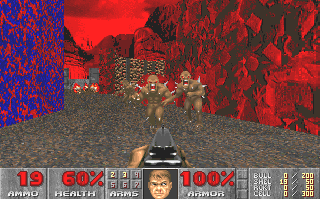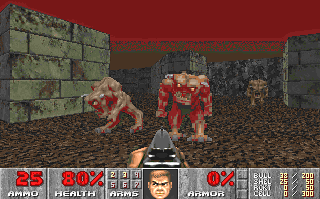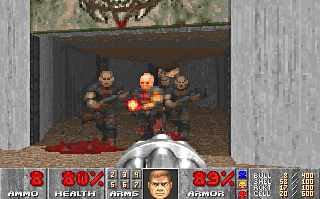|
· BACK TO DOOM PAGE · BACK TO THEOLOGY PAGE · DAVID'S HOME PAGE ·
The Meaning of Doom
Theological Implications of a
Much Maligned Video Game

Many good people believe that the computer games called First Person Shooters are a bad influence on society. That may be true of some games. But I see some good theology in Doom™, the most popular FPS ever. Like most war-based games, it assumes the Just War theory, which, in the West, is a Christian construct. That's good, but by itself, it may not be enough to commend a game. But Doom™ goes further, in that the storyline features both corruption of the world and irreversible damnation of some of its inhabitants. The game is not especially about damnation, of course, its title notwithstanding; the theme is good vs. evil. Since the player is on the side of Good, that's a favorable point; but, like the assumption of Just War theory, it's not unique, either. The topic of eternal damnation is a bit rare for a game, though. That gives us a clue about why the Doom™ myth rings true.
And he opened the bottomless pit, and smoke arose out of the pit... Then out of the smoke locusts came... And to them was given power, as the scorpions... And they were not given authority to kill, but to torment.
The way that the game's storyline represents the source and the effects of evil bears a remarkable resemblance to the traditional Jewish and Christian view.  Note also the effects of evil on the world portrayed in the game. Take a good look at the graphics. Practically everything is weathered, rusting, cracked, stained, scratched, pock-marked, overgrown, rotting, intermittent, emblazoned with a Hellish insignia; oozing, leaking, spewing, or filled with noxious liquid; burning, dying or dead, or some combination thereof. It is a world infected, polluted, and corrupted. Note also the effects of evil on the world portrayed in the game. Take a good look at the graphics. Practically everything is weathered, rusting, cracked, stained, scratched, pock-marked, overgrown, rotting, intermittent, emblazoned with a Hellish insignia; oozing, leaking, spewing, or filled with noxious liquid; burning, dying or dead, or some combination thereof. It is a world infected, polluted, and corrupted. 
Where moth and rust corrupt, and thieves break through and steal.
So is the real world, though we do our best to cover it up and forget about it. The world is dying. Everything wears down; everything breaks eventually. The ground itself is under the Curse. Brambles and deadwood testify to its effects. Erosion and pollution leave evidence in nature of man's fallen condition.
It's remarkable enough that the environment portrayed by the game reflects the Curse of Genesis 3, but consider also the two origins of the monsters the player faces. Some are from the pit of hell itself. What creatures could offer a greater threat, and be more deserving of death?
But others were formerly our comrades, our brothers in the fight against evil, who have been vanquished by the Enemy—overcome but not annihilated. By some black sorcery, their bodies were preserved through death to be possessed or somehow controlled by the forces of evil. They are walking dead men, fallen into utter ruin, their wills in bondage to their Enemy. Through no choice of their own, they have switched sides in the battle; not only do they no longer fight for Good, they fight against it on the side of Evil. They have become utterly, incurably evil. not only do they no longer fight for Good, they fight against it on the side of Evil. They have become utterly, incurably evil.
Thus they deserve to be, and must be, completely destroyed. There is no hope for them. Even if their new master wins, they loose, for they have already lost, and they have lost all, forever.
You were dead in your tresspasses and sins...having no hope and without God in the world.
If the guys at id software had consulted with the world's finest Christian theologians, they could hardly have come up with a more apt analogy for mankind's condition. Like the Former Humans, Sergeants, and Commandos of Doom™, we are fallen creatures, dead men walking, enemies of God by our very nature—and not by our own individual choices, initially. Long ago, the Evil One attacked Man, scored an early victory, and took up residence among us. He has taken command over us; we cannot help but fight for him, if left to ourselves in our natural state.
...that they may come to their senses and escape from the trap of the devil, who has taken them captive to do his will.
The world is dying, and we are dying. We are born in a state of perpetual decay. Not only our bodies but our minds and souls also tend toward chaos and corruption.
This article is not yet complete.
David J. Finnamore
Orlando, FL
|